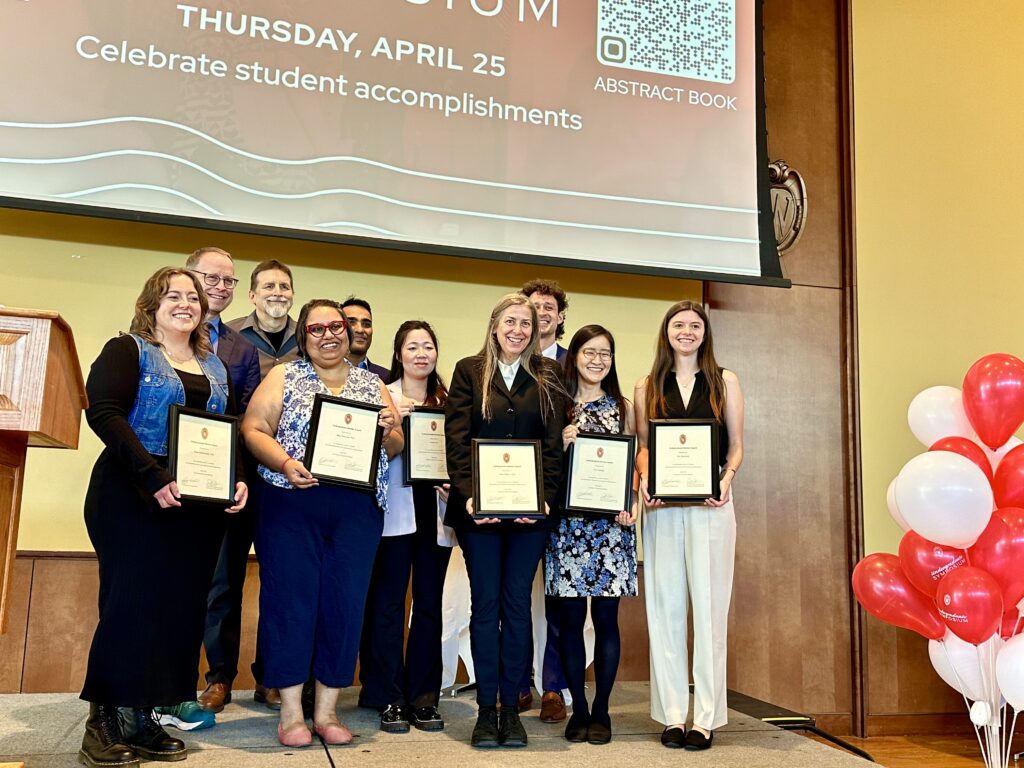Congrats to Prof. Pupa Gilbert on earning an Award for Mentoring Undergraduates in Research, Scholarly and Creative Activities!
The Office of the Provost offers awards to recognize the important role mentors play in fostering undergraduates’ intellectual, personal and professional growth through participation in high-impact practices including research, scholarly and creative endeavors. These awards provide mentors with recognition for their excellence in mentoring undergraduates and their contribution to our students’ Wisconsin Experience.
Gilbert has mentored many undergraduate and graduate students as a physics professor at UW–Madison. Some of these students, like Andrii Hopanchuk ‘24, worked on individual research projects and served as an undergraduate teaching assistant for her popular course, Physics 109, Physics in the Arts.
“Pupa has supported me in exploring my own work, which ultimately culminated in me single-authoring a paper and publishing it in a peer-reviewed journal,” Hopanchuk wrote in his nomination letter. “Another way Pupa has impacted my professional growth was by maintaining a high standard for me (I wish more people did that).”
In 2020, when in-person undergraduate student research positions were almost non-existent, Gilbert had an idea to hire over a dozen students, largely from the Mercile J. Lee Scholars program, to conduct remote analysis on complicated data sets. Machine learning models are only as good as the data they are trained on, and Gilbert reasoned that a large group of diverse students conducting parallel analyses would yield conclusions that computers never could.
This group of 15 students, dubbed the Cnidarians (from the phylum that includes corals, anemones, and jellyfish — animals these students analyzed in Gilbert’s group), each processed the data, making 11 distinct decisions along the way. At weekly Zoom meetings, results were compared. If the majority of Cnidarians agreed on a solution, it was likely the correct one; if not, the students walked others through the process of how they made the decisions they did.
“We (the Cnidarians, really!) discovered many ways to improve data processing,” Gilbert wrote in a Springer Nature “Behind the Paper” feature. “Diversity is our strength. The accuracy, precision, and overall quality of the results is outstanding and unprecedented.”
Many Cnidarians were among Gilbert’s nominators for the Mentoring award.
“Pupa is one of the few professors I have experienced whose energy for learning is contagious – any student under her mentorship is bound for success,” wrote Virginia Quach ’23, now a Pharmacy doctoral student.
Isabelle LeCloux is a senior chemical engineering major who worked with Gilbert both at UW–Madison and at Lawrence Berkeley National Lab this past summer. She wrote:
“Working with other undergraduates in the welcoming and encouraging environment fostered by Professor Gilbert has allowed me to explore topics that I otherwise would not have been exposed to in my curriculum. Her positive attitude makes her a delight to work with and I always feel that I can ask any questions I may have regarding our work in the group.”
Biology major CP Breit joined the Cnidarians after they had already been working together for a year, but she said that Gilbert made it easy to join the already-established team.
Breit wrote: “During this training period Dr. Gilbert was incredibly supportive and really gaveme the confidence to start processing data quickly. There were certainly shortcomings in my technical acumen but Dr. Gilbert was always positive and encouraging, allowing me to make mistakes, learn how to correct them, and improve.”
All the Cnidarians were named as co-authors on the Gilbert group’s most recent paper, published in February in the prestigious journal Nature Communications. Other Cnidarians co-authored a 2022 JACS paper.
Gilbert and other mentoring awardees were recognized at the Mentor Awards Ceremony held during the annual Undergraduate Research Symposium on April 25.
